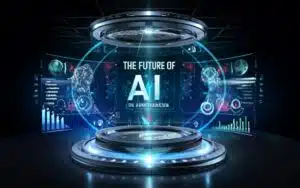The Impact of Artificial Intelligence on Our Daily Lives
The AI market has witnessed exponential growth in recent years, with its size estimated to reach a staggering $184 billion in 2024. This surge reflects the pervasive influence of AI across various sectors, revolutionizing how we live, work, and interact.
Thank you for reading this post, don't forget to subscribe!Historical Perspective
Historical depictions of AI often conjured visions of humanoid robots performing household chores, a concept popularized by media narratives. While the reality may not have met these lofty expectations, the emergence of AI assistants like Alexa and Siri has fundamentally transformed our daily interactions with technology.
Current Impact of AI
In the present day, AI’s impact is palpable in our homes, workplaces, and beyond. Through home automation systems, AI streamlines mundane tasks, from adjusting thermostat settings to managing grocery lists. Moreover, AI-driven algorithms power virtual assistants, enhancing productivity and convenience in our daily lives.
Future Projection
Looking ahead, the projected market size of $184 billion underscores the immense potential of AI technology. With ongoing advancements in machine learning and data analytics, the AI market is poised for continued expansion, fueling innovation across diverse industries.
AI Integration in Daily Life
AI’s integration extends far beyond household chores, permeating various facets of daily life. From unlocking smartphones using facial recognition to receiving personalized recommendations on streaming platforms, AI enhances user experiences and streamlines interactions with technology.
AI in Communication
In the realm of communication, AI-driven tools like Grammarly and autocorrect algorithms facilitate error-free writing, improving overall clarity and efficiency. Additionally, AI-powered email filters and cybersecurity solutions protect users from malicious threats, safeguarding digital communications.
Digital Voice Assistants
Digital voice assistants have become indispensable companions, offering hands-free assistance with tasks ranging from setting reminders to providing weather updates. Powered by advanced natural language processing algorithms, these assistants continue to evolve, adapting to user preferences and evolving needs.
Smart Home Technology
The evolution of smart home devices exemplifies AI’s transformative impact on residential living. From smart thermostats that optimize energy consumption to voice-controlled appliances that simplify household tasks, AI-powered technologies enhance comfort, convenience, and efficiency in the home environment.
AI in Healthcare
In the healthcare sector, AI is revolutionizing medical diagnosis and treatment, leveraging machine learning algorithms to analyze vast amounts of patient data and identify patterns indicative of disease. From early detection of cancer to personalized treatment recommendations, AI holds the promise of improving patient outcomes and driving medical innovation.
AI in Finance
AI’s applications in finance are diverse and far-reaching, encompassing algorithmic trading, risk management, fraud detection, and customer service automation. By harnessing the power of predictive analytics and machine learning, financial institutions can optimize decision-making processes, enhance operational efficiency, and deliver tailored services to clients.
AI in Transportation
In transportation, AI is driving innovations in autonomous vehicles, traffic management, and logistics optimization. With advancements in sensor technology and artificial intelligence, self-driving cars promise to revolutionize urban mobility, reduce traffic congestion, and improve road safety.
AI in Education
In education, AI-powered tools are reshaping the learning experience, facilitating personalized instruction, adaptive learning pathways, and student performance analytics. From intelligent tutoring systems to virtual classroom assistants, AI holds the potential to democratize access to quality education and foster lifelong learning.
AI Ethics and Challenges
Despite its transformative potential, AI raises ethical concerns regarding privacy, bias, and job displacement. Addressing these challenges requires thoughtful regulation, transparency, and ongoing dialogue among stakeholders to ensure that AI technologies are deployed responsibly and ethically.
Conclusion
In conclusion, the pervasive influence of AI underscores its status as a defining technological paradigm of the 21st century. As AI continues to evolve and permeate various aspects of our lives, it is imperative to prioritize ethical considerations and harness its potential to drive positive societal impact.
FAQs
- Accuracy of Face ID technology Face ID boasts impressive accuracy, with minimal chances of false identification.
- AI’s role in online entertainment AI algorithms personalize recommendations on platforms like Netflix, enhancing user experience.
- AI in social media content moderation AI analyzes user behavior to filter out inappropriate content, contributing to a safer online environment.
- AI’s impact on cybersecurity While AI enhances cybersecurity measures, the complete elimination of threats remains a challenge.
- Benefits of smart home technology Smart home devices offer convenience, energy efficiency, and enhanced security, enhancing quality of life.
- Can AI replace human doctors? While AI augments medical diagnosis and treatment, human expertise and empathy remain irreplaceable in healthcare.
- How does AI impact the financial industry? AI revolutionizes financial services through automation, risk management, and personalized customer experiences.
- What are the challenges of implementing AI in transportation? Challenges include regulatory hurdles, safety concerns, and infrastructure limitations in deploying autonomous vehicles.
- How can AI improve education? AI facilitates personalized learning, adaptive assessments, and educational analytics, catering to diverse learning needs and optimizing teaching outcomes.
- What are the ethical concerns surrounding AI? Ethical concerns include privacy infringement, algorithmic bias, job displacement, and the potential for misuse of AI technologies.
Want to learn more about AI and big data from industry leaders?
Check out the AI and Big Data Expo Taking place in Amsterdam, California, and London. Other leading events are co-located with comprehensive events Intelligent Automation Conference, BlockX, Digital Transformation Week, And Cyber Security and Cloud Expo.











